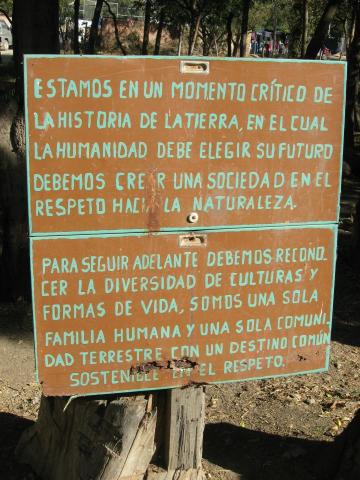
Photo: A sign outside the Maryknoll center in Cochabamba, Bolivia. Translation: "We are at a critical moment in the history of the earth, and humanity must choose to be a society that has respect for nature ... We have diverse cultures and lifestyles but we are one human family and one earth community with a common destiny ..."
Lent is about change, about growth, about taking another step toward the “fullness of life” that Jesus promises to each of us. I tend to understand change as something that is incremental, one step at a time but I am also aware of how easy it is to get caught up in what is, and lose sight of what could be. The real challenge is to see ourselves and our world as they are at this moment and at the same time see all the wonderful possibilities that could be, all of the new, “eye has not seen” things that God is planting in our hearts and in our world every day. Lent is a privileged time to see what might be possible, a time to see the next step but also a time to change direction, to be converted, to see something new that I have never seen before.
The Andean peoples in South America believe that God periodically shakes up the world, that he turns the world upside down every five hundred years or so. They call it Pachacuti. It is very much like what Mary points out in the Magnificat in Luke 1:46-55: “He has cast down the mighty from their thrones, and lifted up the lowly. He has filled the hungry with good things, and the rich he has sent away empty.”
There are a lot of things about our world that I do not like, things that I want to change yet at the same time I, and I believe we all, get very comfortable with what is. I want to change the mindless destruction of our planet and enjoy the benefits of clean air and water. At the same time I do not want to give up my car, my computer, the internet or being able to travel great distances with relative ease. I want to live in a world where everyone has good housing, enough food, possibilities for education and good health care. At the same time I have grown accustomed to a number of luxuries and now I even see some of these luxuries as necessities.
I believe that the Andean people are correct, that every once in a while God turns our worlds upside down. Can we imagine how Mary’s world was turned upside down when Gabriel asked if she would be the mother of Jesus? How David’s world was was turned upside down in the first reading when he was singled out as God’s Chosen One and God’s Spirit adhered to him? How does it feel to go from being darkness to being light in the second reading? Certainly Jesus turned the world upside down for the man born blind from birth. Now he could see, really see: himself, his world and how and where God was acting in that world.
Are we ready to respond to God’s turning our world upside down? Change, conversion, is not easy and it is not comfortable. Will we respond in the same way as Mary, as the man born blind from birth or will we respond as the Pharisees?
As we come to the end of Lent let us take the time to stop and look around. Let us wake up and look to see where and how God is transforming us and our world. The Good News is all about new possibilities. Things do not have to be the way they are. God is alive in the cosmos, in history and in the life of each of us. God is bringing about the new creation, it has already begun. Do we have eyes that can see?
